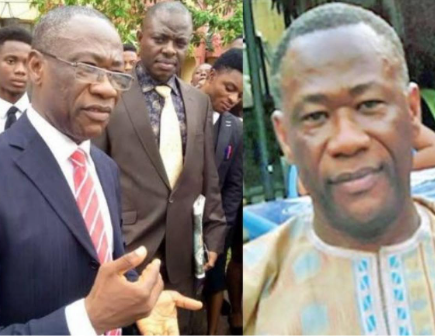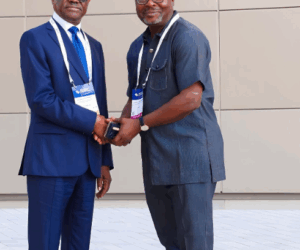
The Federal High Court in Abuja on Monday, November 17, sentenced the suspended Dean of the Faculty of Law, University of Calabar (UNICAL), Prof. Cyril Ndifon, to five years imprisonment without an option of fine for s3xual harassment.
Justice James Omotosho held that the Independent Corrupt Practices and Other Related Offences Commission (ICPC) had proved counts one and two against the UNICAL professor beyond a reasonable doubt.
The judge therefore sentenced Ndifon to two years imprisonment on count one and five years on count two. The sentences are to run concurrently.
Justice Omotosho, however, discharged and acquitted Sunny Anyanwu, initially a member of Ndifon’s legal team, of all charges against him.
He held that the anti-corruption agency failed to establish any link between Anyanwu and the offences in counts three and four.
The ICPC had, in an amended charge dated January 19, 2024, filed a four-count charge against Ndifon (1st defendant) and his lawyer, Anyanwu (2nd defendant).
Ndifon had been the sole defendant when the case was first filed, but Anyanwu was later joined after allegations emerged that he attempted to pervert the course of justice by calling the star witness during the pendency of the case to threaten her.
Anyanwu, while serving as Ndifon’s lawyer, was alleged to have called the witness, identified as TKJ, advising her not to honour ICPC invitations or write any statement concerning the s3xual harassment allegations against his client.
In the amended charge, counts one and two accused Ndifon of s3xually harassing female students of the institution.
The ICPC alleged that while serving as Dean of the Faculty of Law, Ndifon asked a female Diploma student and star witness, TKJ, to send him “pornographic, indecent and obscene photographs of herself” via WhatsApp.
He was also alleged to have asked her on various occasions to perform a “blow job” for him in exchange for gaining admission to study Law.
Ndifon was accused of using his position as a public officer to sexually harass several female students and obtain undue advantage over them.
While count three was preferred solely against Anyanwu, both defendants were jointly charged in count four for attempting to influence the course of justice.
The ICPC, on February 14, 2024, closed its case against the duo after its fourth witness, forensic analyst Bwaigu Fungo, was cross-examined.
The defendants subsequently filed a no-case submission, arguing that the prosecution had failed to prove the allegations. But on March 6, 2024, Justice Omotosho dismissed the application and ordered them to enter their defence.
Ndifon testified as the first defence witness (DW1), while CSP Babagana Mingali, a forensic analyst at the Office of the National Security Adviser (ONSA), testified as DW2.
Delivering judgment, Justice Omotosho held that the ICPC successfully established the essential elements of the offences in counts one and two.
He noted that Ndifon failed to rebut evidence showing that he had unduly pressured TKJ to engage in immoral acts.
“The victim was desirous of being admitted into the university, and the 1st defendant was in a position of advantage to help her, being the dean, and the diploma course is under his supervision.
“The instances of undue advantage are so much. The 1st defendant abused his office,” the judge said. He added that the court found Ndifon not to be a witness of truth.
“Consequently, the 1st defendant is hereby convicted of count one and count two,” the judge ruled, noting that he considered Ndifon’s status as a first-time offender when tempering justice with mercy.
On count three, the judge held that although Anyanwu placed a call to TKJ, the call took place about four months before the investigation into the matter commenced.
He said the court could not speculate on Anyanwu’s intention at the time, and therefore discharged and acquitted him of counts three and four.
Justice Omotosho, however, condemned Anyanwu’s professional misconduct in calling a potential witness in his client’s case. He also criticised Ndifon’s immoral behaviour.
“It was with dismay that I read through this case that a Dean of Law can turn himself into a sexual predator,” he said, describing Ndifon as “a disgrace to the community of learned persons” who must face the consequences of his actions.
He added that the sentence should serve as a deterrent to other public officers who exploit their positions to prey on women.





